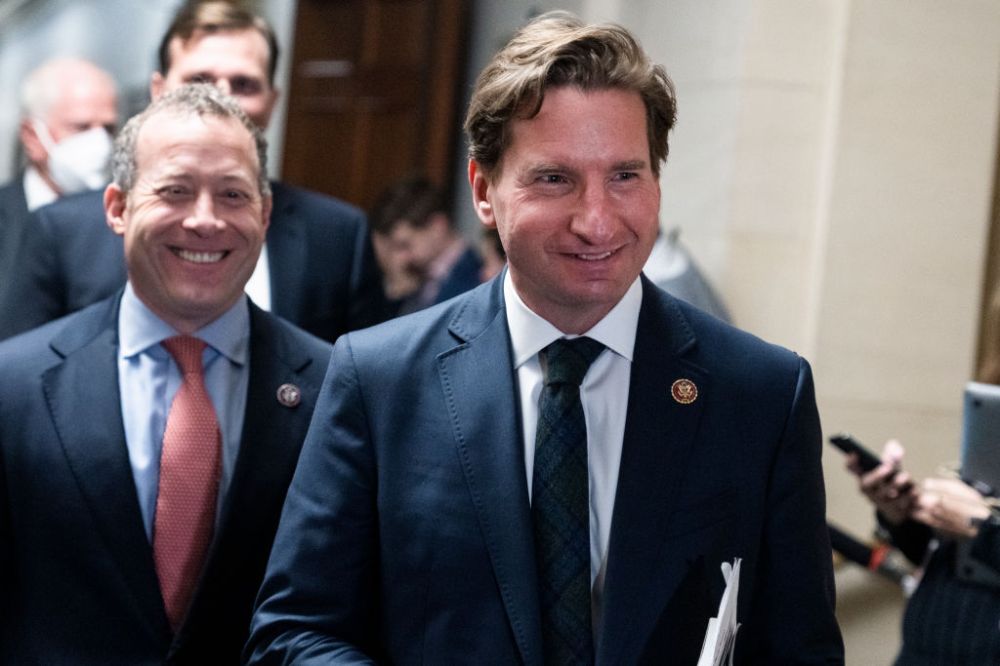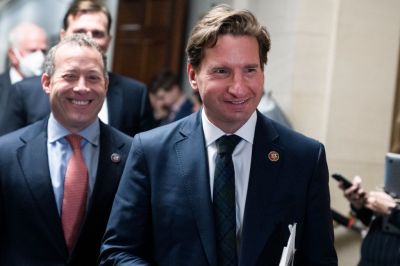Happy Wednesday! Another rough week for White House press secretary Karine Jean-Pierre, who mispronounced both Hawaii senators’ names—and misgendered one of them—when speaking during her Tuesday briefing about the Maui wildfires.
Up to Speed
- On Monday a grand jury in Fulton County, Georgia, charged former President Donald Trump and 18 co-defendants with conspiring to conduct a criminal enterprise in connection with their efforts to overturn the 2020 election results, in violation of Georgia’s Racketeer Influenced and Corrupt Organizations (RICO) Act. Trump faces 13 felony charges, including false statements and writings, perjury, and conspiracy to defraud the state. The official indictment was unsealed Monday evening after court officials posted and quickly deleted a two-page docket—first reported by Reuters—detailing the charges on its website. The Fulton County court clerk later called the document a “fictitious docket sheet” that was meant to “test the system and conduct a trial run.”
- In a Tuesday court filing, federal prosecutors denied allegations from Hunter Biden’s attorneys over the weekend that the Justice Department decided to “renege on the previously agreed-upon plea agreement” on Friday, the same day Attorney General Merrick Garland elevated U.S. Attorney David Weiss to special counsel status in the Hunter Biden probe. “The Defendant chose to plead not guilty at the hearing on July 26, 2023, and U.S. Probation declined to approve the proposed diversion agreement at that hearing,” federal prosecutors responded on Tuesday. “Thus, neither proposed agreement entered into effect.”
- Trump, the GOP frontrunner, has not ruled out participating in next week’s Republican National Committee-sponsored debate in Milwaukee. Longshot candidate Will Hurd is touting fundraising statistics that put him on the verge of qualifying—at least in terms of the minimum threshold of 40,000 donors established by the RNC. But the former president and the former congressman both say they have no intention of satisfying one particular RNC requirement for earning a spot on the debate stage—signing a loyalty pledge committing them to support the GOP’s eventual 2024 nominee. So, is the RNC flexible on this prerequisite? “No,” party officials tell The Dispatch.
How Serious Are Calls for a Biden Primary Challenge?
Rep. Dean Phillips is saying the quiet part out loud: Anxiety about President Joe Biden is rampant inside the Democratic Party.
Already the oldest president in history, Biden will be weeks away from his 82nd birthday by Election Day 2024. Political operatives, campaign donors, and elected officials all worry about whether he can endure the rigors of a real presidential campaign, one without a coronavirus pandemic to keep him home for long stretches.
Phillips, a third-term congressman who represents a suburban Minneapolis district, is begging Democrats more prominent than himself, preferably a moderate Midwestern governor, to challenge Biden in the primary. If no one answers the call, Phillips is leaving the door open to running himself. The commander-in-chief is a good man and a good president, the congressman insists. He’s simply too old for the job and polls show Democratic voters are hungry for fresh leadership.
“I don’t think people can be mad about what he’s saying,” a Democratic House aide tells The Dispatch. “We’re all doing our own polling and everyone’s talking to the same donors. Dean isn’t seeing or hearing anything everyone else isn’t.”
Polls also show voters across the political spectrum dread a rematch between Biden and the Republican frontrunner, former President Donald Trump. Phillips declined to comment for this story but made those points Sunday in an interview with Chuck Todd on NBC’s Meet The Press. Other Democratic insiders are airing the same concerns to him, he said.
In interviews with The Dispatch, more than a half-dozen veteran Democratic operatives said these discussions are indeed occurring across the party.
The alarm bells ring louder when Democrats contemplate Biden running against any Republican not named Trump, who himself is 77 years old. “There are a lot of Democrats who feel that, if it’s any other Republican, he loses, but that as long as Trump is the nominee, he’s fine,” a Democratic lobbyist says.
But Phillips is either missing or leaving out important context, Democratic operatives say. “A certain amount of this is typical Democratic handwringing that happens in presidential cycles,” says a Democratic strategist in a Midwestern battleground state. Every four years, Democratic activists and insiders fret about their nominee, so doubts about Biden are not distinct compared to his predecessors.
It’s also important to distinguish between political operatives and campaign donors.
Democratic insiders say the party’s political operatives are realistic: The incumbent president has declared for reelection and no political figure capable of pushing him aside will step forward. Nor is there any political will in the party to find such a candidate. Barring a Biden about-face or a health event, he will be the Democratic nominee.
But Democratic donors, who don’t have the same operational understanding of the process and are susceptible to flights of fancy, are simply unrealistic about the prospects of sidelining the president.
“It’s not apparent to people who are very successful financially and dabble in politics,” a Democratic consultant says. So if Phillips has spent the last several months talking to donors about this issue, it’s understandable that he might think there’s a groundswell of institutional support to challenge Biden in the primary. “If you meet with a bunch of rich people, it creates an echo chamber,” this Democrat explains.
Phillips, 54, who ran for office in 2018 largely as a protest against Trump, has emerged as an unlikely thorn in Biden’s side. Since arriving in Congress, the mild-mannered Democrat has been neither a progressive firebrand nor a centrist agitator. On the House floor, Phillips has voted with the president 100 percent of the time, according to an analysis by FiveThirtyEight. Many Democrats who share his apprehension about Biden are nonetheless frustrated with his effort.
Phillips, they say, lacks a strategy and an endgame. Plus, incumbent presidents who face primary challenges are in greater danger of losing the general election. It happened to Democratic President Jimmy Carter in 1980 and Republican President George H.W. Bush in 1992. Trump’s primary challengers in 2020 were minimal compared to what Carter and Bush had to deal with, but he lost reelection as well.
“Many Democrats, in their heart of hearts, would rather we didn’t have an 80-year-old president running for reelection,” says Garry South, a Democratic strategist in California. “But he is running for reelection, and there’s only six months until the first primary. There isn’t time practically speaking for a viable challenger to get moving … Democrats need to buck up. Biden will be our nominee.”
South Carolina GOP Content to Let Nevada Republicans Vote Third
The South Carolina Republican Party has no plans to move up the date of its February 24 presidential primary to counter the Nevada GOP’s decision to schedule its 2024 nominating caucuses for February 8.
“We’re not going to change,” Abby Zilch, South Carolina Republican Party spokeswoman, tells The Dispatch. “It really won’t affect us.” The South Carolina GOP’s priority is maintaining the state’s status as host of the “first in the South” primary, and the Nevada party’s move does not affect that.
Traditionally, South Carolina has voted third on the quadrennial GOP presidential nominating calendar, following the Iowa caucuses and New Hampshire primary, respectively. Nevada, a relatively recent addition to the states approved to vote early (before March) by the Republican National Committee (RNC), usually held its contest fourth. But the RNC confirms that the order in which the states vote is left to their discretion, meaning party rules do not prohibit Nevada from leapfrogging South Carolina.
The only complication in the Nevada Republican Party’s plans is that the Silver State, by law, is set to hold a traditional primary for both the GOP and the Democratic Party on February 6. The Nevada Republican Party sued to block the state from holding a GOP primary, but was unsuccessful. The state GOP, with ultimate authority over how its delegates to the national convention in Milwaukee are awarded, chose to move ahead with a caucus nonetheless and unveiled the date for the contest earlier this week.
“The First in the West Caucus underscores Nevada’s prominence as a key player in the Presidential nomination process. The caucus will provide Nevada voters with the unique opportunity to engage with the candidates, discuss important issues, and voice their opinions on the future direction of the Republican Party,” the Nevada GOP says in a press release. Candidate filing runs from September 1 through October 15.
Nevada Republicans are selling the caucus as more secure than the state administered primary, emphasizing the contest will use paper ballots, require voters to present identification before participating, and be held on just one day. The question is whether the state GOP can raise the necessary resources to even pull it off. Gov. Joe Lombardo, a Republican, is not involved in the effort, sources say, and the party is not swimming in cash.
At press time, a Nevada GOP spokesman had not responded to questions regarding the financing of the party’s 2024 presidential nominating caucus.
Notable and Quotable
“The 2020 election in Georgia was not stolen. For nearly three years now, anyone with evidence of fraud has failed to come forward—under oath—and prove anything in a court of law. Our elections in Georgia are secure, accessible, and fair and will continue to be as long as I am governor. The future of our country is at stake in 2024 and that must be our focus.”
—Georgia Gov. Brian Kemp responding to Donald Trump’s Truth Social post that a new election fraud report to be issued Monday will exonerate him of all 2020 election-related charges, August 15








Please note that we at The Dispatch hold ourselves, our work, and our commenters to a higher standard than other places on the internet. We welcome comments that foster genuine debate or discussion—including comments critical of us or our work—but responses that include ad hominem attacks on fellow Dispatch members or are intended to stoke fear and anger may be moderated.
With your membership, you only have the ability to comment on The Morning Dispatch articles. Consider upgrading to join the conversation everywhere.